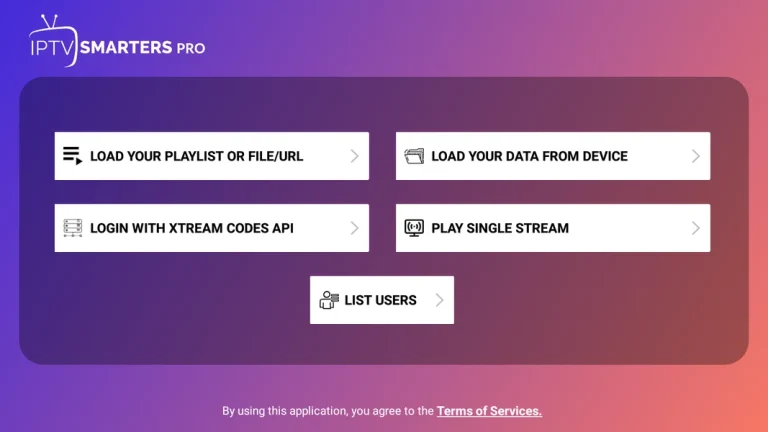Can iptv be Tracked Behind the screens?
Have you ever wondered about the digital footprints left behind by your IPTV activities? Can IPTV be tracked, revealing your viewing habits and preferences to unseen eyes? In a world where streaming has become an integral part of our daily lives, these questions spark curiosity and concern. The landscape of IPTV surveillance is intricate, and understanding its nuances is crucial in safeguarding your digital privacy.
Buy iptv subscriptions
But these concerns don’t merely end with acknowledgment—they lead us to a deeper exploration. The third paragraph acts as a gateway, enticing readers to delve into the comprehensive insights awaiting them in the main article. As we navigate the labyrinth of IPTV tracking, we bring in the expertise of renowned cybersecurity analysts, offering valuable perspectives on safeguarding your digital presence. So, join us as we uncover the intricacies of IPTV tracking and empower ourselves in the evolving landscape of digital surveillance.
Understanding IPTV and Its Rising Popularity
Before we embark on the journey of unraveling the tracking mystery, let’s first understand what IPTV is and why it has become a household name. Internet Protocol Television delivers television content through Internet Protocol (IP) networks, bypassing traditional cable or satellite systems. This allows users to access a vast array of channels and on-demand content, making it a compelling choice in the era of streaming dominance.

Can IPTV be tracked?
The question of whether IPTV (Internet Protocol Television) can be tracked is a multifaceted one, involving considerations related to technology, privacy, and the practices of service providers. In this exploration, we’ll delve into the intricacies of IPTV tracking, shedding light on the factors that contribute to the ability to track IPTV usage.
HD IPTV Stream How to Watch High-Quality TV Channels Online
Understanding IPTV Tracking:
1. Purpose of Tracking:
Tracking IPTV usage can serve various purposes, including content personalization, targeted advertising, and compliance monitoring. Service providers, advertisers, and even regulatory bodies may engage in tracking to achieve specific objectives.
2. Metadata Collection:
IPTV tracking involves the collection of metadata, which encompasses data about user activities. This metadata can include information such as the channels watched, the duration of viewing, and the devices used for streaming.
3. User Profiling:
Advanced tracking systems use algorithms to create user profiles based on collected metadata. These profiles enable service providers to offer personalized content recommendations and advertisers to target specific demographics.
The Technology Behind IPTV Tracking:
1. Data Encryption:
The level of tracking often depends on the security measures implemented by IPTV service providers. Some providers may encrypt user data, making it more challenging for unauthorized parties to access and track user activities.
2. Anonymity Challenges:
While encryption can enhance privacy, challenges may arise if users do not take additional steps to anonymize their online activities. Without proper safeguards, tracking remains a potential concern.
Risks and Concerns:
1. Privacy Breaches:
Unauthorized access to IPTV data raises concerns about privacy breaches. Users may be wary of their viewing habits being scrutinized without their explicit consent.
2. Security Vulnerabilities:
The presence of security vulnerabilities in tracking systems poses a risk of exploitation by malicious actors. This could lead to unauthorized access to sensitive user information.
Unlocking Entertainment The World of IPTV Gratuit
Safeguarding Your Privacy:
For users concerned about IPTV tracking, several proactive measures can enhance privacy:
1. Use a VPN:
Employing a Virtual Private Network (VPN) can add an extra layer of anonymity by encrypting internet connections and making it more difficult for third parties to track online activities.
2. Choose Reputable Providers:
Opting for IPTV service providers with a reputation for prioritizing user privacy and implementing strong security measures is crucial.
3. Regular Updates:
Keeping devices updated with the latest security patches and using reliable antivirus software helps protect against potential security threats.
In conclusion, while IPTV can be tracked to varying extents, users can take proactive steps to safeguard their privacy. As technology continues to evolve, staying informed about privacy practices and implementing security measures empowers users to enjoy IPTV content with greater peace of mind.
How is IPTV accessed?
Accessing IPTV (Internet Protocol Television) involves several steps, and the process may vary based on the type of device, the IPTV service provider, and the application or platform used. Here’s a general overview of how IPTV is typically accessed:
1. Choose an IPTV Service Provider:
The first step is to select an IPTV service provider. There are various providers offering different channel packages, features, and pricing plans. Users can choose based on their preferences and requirements.
2. Subscribe to an IPTV Plan:
Once a provider is selected, users need to subscribe to an IPTV plan. This usually involves creating an account on the provider’s website, selecting a subscription package, and completing the payment process.
3. Receive Login Credentials:
After subscribing, users receive login credentials (username and password) from the IPTV service provider. These credentials are essential for accessing the IPTV service on supported devices.
4. Download and Install IPTV Application:
Depending on the device used, users may need to download and install the IPTV application provided by the service. IPTV applications are available for various platforms, including smartphones, tablets, smart TVs, streaming devices, and dedicated IPTV boxes.
5. Launch the IPTV Application:
Once the application is installed, users can launch it and log in using the provided credentials. The application serves as the interface through which users access live TV channels, on-demand content, and other features offered by the IPTV service.
6. Navigate Through the User Interface:
The IPTV application typically has a user-friendly interface that allows users to navigate through different categories, channels, and content options. Users can browse and select the channels or content they want to watch.
7. Choose Channels and Content:
Users can choose from a variety of channels and on-demand content available in their subscription package. IPTV often provides a wide range of channels, including live TV, movies, TV series, and special events.
8. Enjoy IPTV Content:
Once the desired channel or content is selected, users can start enjoying IPTV content in real-time. The streaming experience may include features like pause, rewind, and fast-forward, depending on the capabilities of the IPTV application.
9. Use Multiple Devices:
IPTV services often support multiple devices, allowing users to access content on smartphones, tablets, smart TVs, computers, and other compatible devices simultaneously. This flexibility enhances the user experience.
10. Optional: Set Up IPTV on External Devices:
For users who prefer a larger screen, IPTV can be set up on smart TVs, streaming devices (such as Roku or Fire Stick), or dedicated IPTV boxes. This involves installing the IPTV application on the external device and logging in with the provided credentials.
What are the risks of using IPTV?
IPTV (Internet Protocol Television) is a technology that allows the delivery of television content over the Internet. While IPTV offers many advantages, it also comes with certain risks and challenges. Here are some potential risks associated with using IPTV:
- Legal Issues:
- Content Piracy: Some IPTV services may offer unauthorized access to copyrighted content, leading to potential legal consequences for both providers and users.
- Violation of Terms of Service: Using IPTV services that violate the terms of service of content providers or distributors may result in legal action.
- Security Concerns:
- Malware and Viruses: Users may be exposed to malicious software or viruses when using unreliable IPTV services or downloading content from untrustworthy sources.
- Data Security: Transmitting personal information over unsecured IPTV networks can pose a risk to user privacy if proper security measures are not in place.
- Quality and Reliability:
- Service Interruptions: Dependence on internet connectivity means that IPTV services may be affected by network issues, leading to buffering, freezing, or complete service interruptions.
- Varied Content Quality: The quality of content can vary widely among different IPTV providers, and some may offer lower resolution or unreliable streams.
- Subscription Scams:
- Fraudulent Services: Users may fall victim to scams or fraudulent IPTV services that promise premium content at unrealistically low prices, only to disappear or provide subpar service after payment.
- Fraudulent Services: Users may fall victim to scams or fraudulent IPTV services that promise premium content at unrealistically low prices, only to disappear or provide subpar service after payment.
- Device Compatibility:
- Limited Device Support: Some IPTV services may be restricted to specific devices or platforms, limiting the flexibility for users who want to access content on various devices.
- Limited Device Support: Some IPTV services may be restricted to specific devices or platforms, limiting the flexibility for users who want to access content on various devices.
- Network Limitations:
- Bandwidth Requirements: Streaming high-quality content through IPTV can consume significant bandwidth, potentially leading to additional costs for users with limited data plans.
- Network Congestion: During peak usage times, IPTV services may experience network congestion, resulting in degraded streaming quality.
- Lack of Regulation:
- Unregulated Providers: The lack of industry-wide regulations may lead to the existence of unscrupulous IPTV providers, making it challenging for users to distinguish between legitimate and illegal services.
To mitigate these risks, users should choose reputable IPTV providers, respect copyright laws, use secure and reputable streaming devices, and be cautious about sharing personal information. Additionally, staying informed about the legality of the content being accessed and adhering to terms of service is essential for a safe IPTV experience.
Risks and Concerns
While tracking may serve legitimate purposes, it also raises concerns about user privacy. Unauthorized access to IPTV data can compromise sensitive information and lead to privacy breaches. Moreover, the possibility of malicious actors exploiting vulnerabilities in tracking systems poses a significant threat.
Safeguarding Your Privacy
For users concerned about privacy, there are several measures that can be taken to enhance security while enjoying IPTV services.
Use a VPN for Anonymity
A Virtual Private Network (VPN) encrypts your internet connection, making it difficult for third parties to track your online activities. By using a VPN, IPTV users can add an extra layer of anonymity to their browsing experience.
Opt for Reputable IPTV Service Providers
Choosing a reliable and reputable IPTV service provider is crucial. Reputable providers often have robust privacy policies and security measures in place to protect user data.
Regularly Update Security Software
Ensuring that your devices have the latest security updates and antivirus software is a fundamental step in safeguarding against potential threats.
Conclusion
In conclusion, the question of whether IPTV can be tracked is not a straightforward yes or no. It involves a complex interplay of technology, user practices, and the policies of IPTV service providers. Understanding the risks and taking proactive steps to protect privacy is paramount for users navigating the IPTV landscape.
As we continue to witness advancements in digital entertainment, staying informed about the intricacies of IPTV tracking empowers users to make informed choices and enjoy the vast world of online content without compromising their privacy. Whether you are a seasoned IPTV enthusiast or a newcomer exploring the possibilities, knowledge is the key to a secure and enjoyable viewing experience.







